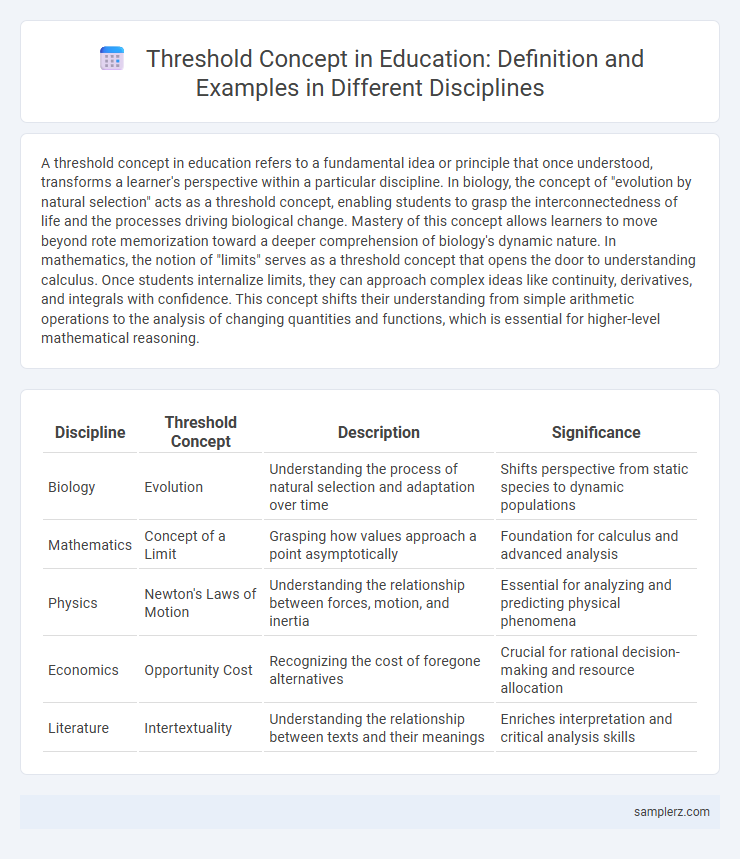A threshold concept in education refers to a fundamental idea or principle that once understood, transforms a learner's perspective within a particular discipline. In biology, the concept of "evolution by natural selection" acts as a threshold concept, enabling students to grasp the interconnectedness of life and the processes driving biological change. Mastery of this concept allows learners to move beyond rote memorization toward a deeper comprehension of biology's dynamic nature. In mathematics, the notion of "limits" serves as a threshold concept that opens the door to understanding calculus. Once students internalize limits, they can approach complex ideas like continuity, derivatives, and integrals with confidence. This concept shifts their understanding from simple arithmetic operations to the analysis of changing quantities and functions, which is essential for higher-level mathematical reasoning.
Table of Comparison
| Discipline | Threshold Concept | Description | Significance |
|---|---|---|---|
| Biology | Evolution | Understanding the process of natural selection and adaptation over time | Shifts perspective from static species to dynamic populations |
| Mathematics | Concept of a Limit | Grasping how values approach a point asymptotically | Foundation for calculus and advanced analysis |
| Physics | Newton's Laws of Motion | Understanding the relationship between forces, motion, and inertia | Essential for analyzing and predicting physical phenomena |
| Economics | Opportunity Cost | Recognizing the cost of foregone alternatives | Crucial for rational decision-making and resource allocation |
| Literature | Intertextuality | Understanding the relationship between texts and their meanings | Enriches interpretation and critical analysis skills |
Defining Threshold Concepts in Education
Threshold concepts in education serve as transformative gateways that reshape a learner's understanding within a discipline, such as the concept of "opportunity cost" in economics or "natural selection" in biology. These concepts are characterized by being integrative, irreversible, and often troublesome, enabling students to progress beyond superficial knowledge to deeper comprehension. Recognizing and defining threshold concepts helps educators design curricula that target these critical learning moments, fostering more effective and lasting educational outcomes.
Characteristics of Threshold Concepts Across Disciplines
Threshold concepts in education serve as transformative gateways essential for mastering complex disciplines. These concepts exhibit characteristics such as being integrative, revealing previously hidden interrelationships within subject matter, and often irreversible, as once understood, learners cannot unlearn them. They are also typically troublesome, challenging existing perceptions and requiring significant cognitive effort for students to grasp fully.
Threshold Concepts in Mathematics: Example and Impact
Threshold concepts in mathematics include the understanding of limits, which shifts students' perception of continuity and change in functions. Mastery of this concept enables learners to grasp calculus and advanced analysis, fundamentally transforming their mathematical thinking. Recognizing such threshold concepts improves curriculum design and teaching strategies by targeting points where students typically struggle.
Key Threshold Concepts in the Sciences
Key threshold concepts in the sciences include understanding the conservation of energy, mastery of the scientific method, and grasping the central dogma of molecular biology. These concepts serve as transformative gateways that significantly alter a student's perception of scientific inquiry and phenomena. Successfully navigating these thresholds enables deeper integration of complex scientific knowledge and fosters advanced problem-solving skills.
Threshold Concepts in Humanities: A Closer Look
Threshold concepts in humanities, such as the understanding of historiography in history or the concept of intertextuality in literature, represent transformative points that once grasped, fundamentally change a learner's perspective. These concepts are often integrative, connecting disparate ideas within a discipline, and irreversible, meaning that once understood, they cannot be unlearned. Mastery of these threshold concepts leads to a deeper, more nuanced comprehension of complex humanistic studies and fosters critical thinking skills essential for advanced academic inquiry.
Transformative Threshold Concepts in Social Sciences
Transformative threshold concepts in social sciences include the idea of "social construction of reality," which shifts students' understanding of knowledge as contextually and culturally shaped rather than absolute. Another key threshold is "power dynamics," enabling learners to critically analyze how power influences social relations and institutions. Mastering these concepts leads to significant changes in perspective, fostering deeper critical thinking and reflexivity in sociological and anthropological studies.
Real-Life Applications of Threshold Concepts in Engineering
Threshold concepts in engineering, such as system dynamics and design thinking, profoundly reshape students' understanding by linking theoretical principles to complex, real-world problems. For example, mastering system dynamics enables engineers to predict and optimize the behavior of interconnected components in industries like aerospace and automotive engineering. Applying design thinking fosters innovative solutions and user-centric product development, crucial for addressing practical challenges in sustainable engineering and technological advancement.
Challenging Threshold Concepts in Language Learning
Challenging threshold concepts in language learning often include the understanding of pragmatics and cultural context, which are crucial for effective communication beyond grammatical accuracy. These concepts act as gateways that transform learners' perceptions, enabling them to navigate nuances such as idiomatic expressions and speech acts in diverse social settings. Mastery of these threshold concepts leads to deeper linguistic competence and intercultural sensitivity essential for language acquisition.
Overcoming Stumbling Blocks: Supporting Students Through Threshold Concepts
Threshold concepts in education represent transformative learning points that reshape students' understanding of a discipline, such as mastering the concept of opportunity cost in economics. Overcoming stumbling blocks requires targeted instructional strategies like scaffolding and formative feedback to help students integrate these challenging ideas. Supporting students through these pivotal moments enhances deep learning and fosters long-term retention of complex subject matter.
Assessing Understanding of Threshold Concepts in Different Disciplines
Threshold concepts in education represent core ideas that transform students' comprehension within disciplines, such as "opportunity cost" in economics or "natural selection" in biology. Assessing understanding involves identifying when learners can apply these concepts to solve complex problems, evidenced by their ability to navigate disciplinary thresholds that often involve troublesome knowledge. Effective assessment methods include concept inventories, reflective writing, and problem-based tasks tailored to capture the liminal space between surface learning and deep conceptual mastery.

example of threshold concept in discipline Infographic
 samplerz.com
samplerz.com